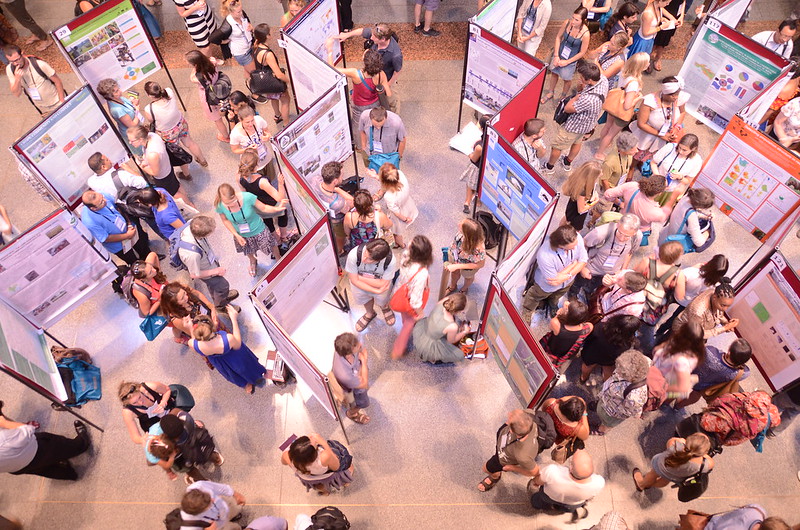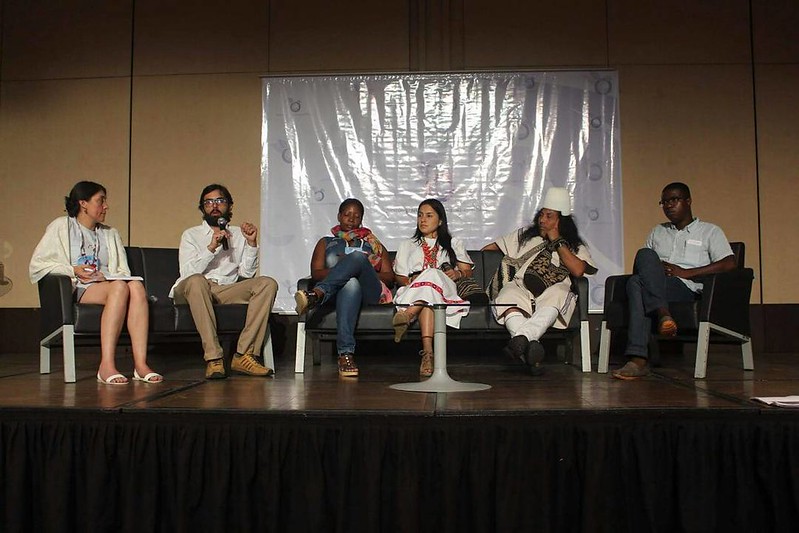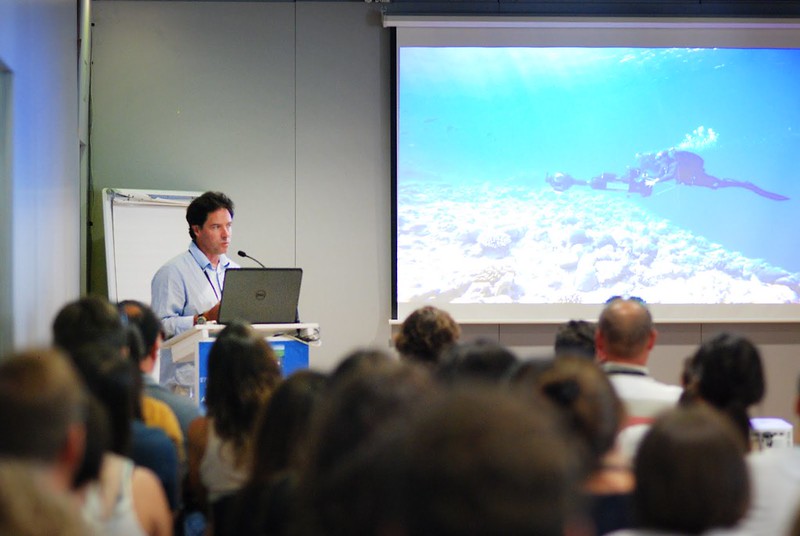ICCB Sign In
Thank you so much for attending the 32nd International Congress for Conservation Biology (ICCB 2025) in Brisbane/Meanjin. Your presence and contributions helped make this global event an inspiring success! If you need a certificate of presentation, please send an email to ICCBTeam@conbio.org.
You can sign in to the ICCB 2025 submission site using your SCB credentials. You have SCB credentials if you are a current or former member of the Society, or if you've previously created an account with SCB to submit an abstract or to register for ICCB 2021 / 2023. New to SCB? Create an account, and then you'll then be redirected to the ICCB site to submit.
Questions? Send an email to ICCBteam@conbio.org.
The ICCB 2025 Scientific Program
There are two views of the Scientific Program:
- Schedule-at-a-Glance, which offers a bird’s eye view of the program so you can easily scan concurrent sessions.
- A detailed “public program” that shows the talks in each session.
ICCB 2025 Sessions Types
ICCB 2025 Program Schedule
- 14 June (Saturday): Pre-congress Sessions Day 1
- 15 June (Sunday): Pre-congress Sessions Day 2
- 15 June (Sunday): ECR Day, 9:00 AM - 3:00 PM
- 15 June (Sunday): Opening Reception, afternoon *Tickets required
- 16-19 June (Monday-Thursday): Main Scientific Program
- 18 June (Wednesday): Science Comedy Night *Tickets required
- 19 June (Thursday): Closing Reception, 6:00 - 9:00 PM *Tickets required
- 20 June (Friday): Post-congress sessions
- 21 June (Saturday) Birdwatching and Nature Walk, 7:00 AM - 10:00 AM, Tree Planting, 8:00 AM - 10:00 AM
Symposium Organizers
See our Frequently Asked Questions here.
Read about our Call for Abstracts here.
ICCB 2025 Presentation Sessions
ICCB 2025 Presentation Types
ICCB 2025 Pre-and-Post Congress and Lunchtime Interactive Sessions
Presentation Guidelines
- Click here for Poster Guidelines
- Presentation guidelines for speed, oral and invited talks coming soon.
Call for Abstracts (Contributed Sessions): Closed
Closed on 21 February, 2025
- One-talk, One-poster Rule: ICCB attendees are limited to one-talk and one-poster. One-talk total is inclusive of invited talks in symposia, and oral and speed talks in contributed sessions. Delegates may present a talk and a poster only if the presentations do not cover the same research.
- Symposium Organizers and Invited Speaker Submission Instructions linked here.
- Abstract Grouping: Abstracts are grouped by topic into cohesive contributed sessions (e.g., Biodiversity, Inventory, Monitoring, and Mapping). Explore Past Sessions: Review the 2023 program for examples of contributed sessions and symposia.
Invited Speaker Deadline Extended until 1 April
The deadline for invited speakers to submit and link their abstracts to their respective symposium has been extended to 1 April. This extension separates the abstract submission deadline for invited speakers from the upcoming submission deadline for oral and speed talks and poster presentations in contributed sessions (21 February).
Enhancing Language Inclusivity at ICCB with Free Academic Proofreading and No Rejection for Poor Language Policy
ICCB is thrilled to partner with Writefull to offer delegates a quick and efficient proofreading service for their abstracts. Normally available to institutions and publishers only, ICCB delegates may use Writefull Revise to improve the language of their abstract. A link to Writefull Revise is embedded in the Abstract Editor within the Abstract Submission Form. The tool uses research-tailored language models to proofread your abstract, making corrections in track changes. It does not store your text or use it to improve the models. See their full privacy policy here. It's especially helpful for non-native English speakers, allowing ICCB delegates to convey their research findings without the added stress of perfecting their written English. Our partnership with Writefull is available during the abstract submission period, but we're excited to offer Writefull Premium between April and June 2025 so registered delegates can receive support on preparing their presentations.
Those who genuinely intend to join us at ICCB are encouraged to use the service we've organized with Writefull. If you’re unsure about attendance at this stage that is okay. Please still feel free to use the tool—but if you know you won’t attend, please reserve this resource for those planning to participate in ICCB.
The ICCB 2025 Scientific Subcommittee has decided to accept all submitted talk/poster abstracts with suitable content and scientific rigor on a first-come, first-served basis until the capacity limit is reached. No abstract will be rejected for poor language. Only abstracts where key ideas cannot be understood will be returned to authors for revision and can be resubmitted.
Definitions of the Different Presentation Sessions
Symposia
ICCB symposia feature multiple speakers who present their insights, perspectives and research on a focused conservation theme, topic, or issue through scientific talks and audience interaction. The Call for Symposia is closed.
The following symposia take place during the main scientific program:
- Regular Symposia are 60-minute sessions that feature four 10-minute oral presentations, each followed by 2-minute question and answer, and include a 12-minute general discussion period (4x12 + 12 = 60).
- Speed talk Symposia are 60-minute sessions that feature ten 4-minute speed talks with 20 minutes discussion at the end at separate breakout spaces/tables (10 x 4 + 20 = 60).
- Extended Symposia are 120-minute sessions and require a special justification. They feature eight 10-minute oral presentations, each followed by 2-minute question and answer, and include a 24-minute general discussion period at the end (8x12 + 24 = 120).
- Flexible Symposia are 60- or 120-minute sessions that can be organized in any format, and provide an option for diverse ways of sharing knowledge (e.g. yarning circle, talanoa) that may be more culturally-appropriate for participants than traditional presentation formats. Unlike the predefined structures of traditional symposia (regular, speed, and extended), where organizers invite speakers to deliver timed presentations, organizers of Flexible Symposia design and implement session formats that best facilitate knowledge sharing within the session's cultural and thematic context. Learn more here.
- Lightning + Poster Symposia are a late addition to ICCB, created so that the congress can accommodate more sessions. Lightning + Poster Symposia will be scheduled immediately before the poster sessions at ICCB. They start with a ten-minute session where invited speakers present one-minute Lightning Talks summarizing their findings. Lightning Talks may include one PowerPoint slide to support the talk. Following the Lightning Talks, your invited speakers will move to their posters – grouped together at the ICCB poster session to maximize engagement – where attendees can engage directly with them. This symposia type requires a minimum of four or a maximum of eight invited speakers.
Contributed Sessions
Contributed sessions feature oral and/or speed talks that are grouped into 60-minute sessions by topic. Abstracts for contributed presentations should be no more than 250 words.
Definitions of the Different Presentation Types:
Oral Talks
Oral presentations share your research with participants in your contributed session and include an opportunity to interact with the audience. Oral presentations demonstrate why your research is valid and matters for conservation and explain the outcomes or expected outcomes of your research. Oral presentations are presented in 10-minutes in length, followed by a 2-minute question and answer period with the audience.
Speed Talks
Like oral presentations, speed talks aim to inform and convey to the audience why your research matters for conservation. They provide a rapid and intense overview of your research. Speed presentations are conducted in 3-minutes with one minute for questions/changeover. At the end of the session there is 20 minutes for breakout discussions at tables.
Poster Presentations
Poster presentations are a visual and concise way to showcase conservation science and projects that provide opportunities to interact with a wide audience. Since a poster format is best when your material can easily be communicated visually, text should be limited to brief statements. Each presentation should make a unified, coherent statement.
To reduce language barriers for participants, we are providing a subscription to Writefull, an AI English editing tool for conference participants. ICCB delegates may use Writefull Revise to improve the language of their abstract. A link to Writefull Revise is embedded in the Abstract Editor within the Abstract Submission Form. We're also excited to offer Writefull Premium between April and June 2025 so registered delegates can receive support on preparing their presentations.
We are also currently exploring more measures, including:
- Setting up a mentoring scheme to find a mentor to help you prepare for your presentation
- Developing guidelines for linguistically inclusive presentations
- Live English subtitles for some oral presentations
- Contributed sessions for presentations in any non-English language withinthe same session, with English captioning (as needed)
If you have specific requirements related to language accessibility, please get in touch with us as early as possible so we can work together to facilitate your participation.
Poster Guidelines
For ICCB 2025, posters should be formatted to A0 size, which measures 841 mm wide × 1189 mm tall (33.1 inches × 46.8 inches). A0 posters are portrait orientation (vertical).
Best Practices
- Allow for a small margin (about 1–2 cm) around the edges so no important text / images are cut off during printing.
- If possible, design your poster so it is easy to read from a distance of 1 (or more).
- Make sure your poster is printed on paper, fabric, or another material suitable for hanging on poster boards (ICCB will provide materials to mount your poster).
Poster Printing
If you plan to print your poster in Brisbane, we’ve curated a list of three local printing services you may wish to consider. This can be a convenient option for those traveling without their poster.
Please be sure to note their deadlines, file format preference, etc.
ICCB One-Talk, One Poster Rule
Attendees may present one talk and one poster. This rule applies to contributed sessions and invited talks in symposia. For example, an invited speaker in a symposium may not present an oral or speed talk in a contributed session, and vice versa. If you give a poster presentation and a talk, the presentations must be on different, unrelated research projects. You may not submit more than two abstracts total (one for a talk and one for a poster). Questions? See the FAQ on abstract submission and the one-talk, one poster rule.
Proposal Rule
You may submit a maximum of two proposals across four ICCB session types (symposia, workshops, training courses, forums). However, you may only submit one proposal per category. For example, you can submit one proposal for a symposium and one for a workshop, but not two proposals for symposia.
Definitions of the Different Interactive Sessions
The call for interactive sessions is closed.
Forums
Forums bring together people with diverse expertise to develop tangible and actionable outputs — such as a list of recommendations, a publication, a policy briefing or a white paper — on a specific conservation issue. Forums are meant for discussion, collaboration, brainstorming, etc. They are not meant to consist of a series of presentations.
Forums typically have a smaller number of participants (10-30 maximum) than training courses or workshops. Forums immediately before or after ICCB (14-15; 20-22) and at lunchtime during the main scientific program (16-19 June). They may require a separate fee for participants in addition to the congress registration fee. These will be held at universities in Brisbane.
Training Courses
Training Courses provide opportunities for registered delegates to receive expert-led education and training on topics relevant for biodiversity conservation, including strategy and project management. ICCB 2025 prioritizes training courses that advance capacity for conservation action in Oceania, though topics may be broadly applicable for global conservation solution / capacity building.
Training Courses may last up to three full days (8 hours each day) and take place before and after the main scientific program or at lunchtime during the main scientific program (16-19 June). They may require a separate fee for participants in addition to the congress registration fee. These will be held at universities in Brisbane.
Workshops
Workshops, whether geared toward students or professionals, are more interactive than training courses and often have an educational / technical component. Workshops share an approach, scientific finding, or technology that provides practical solutions for conservation challenges.
Workshops may last up to three full days (8 hours each day) and take place before and after the main scientific program or at lunchtime during the main scientific program (16-19 June). They may require a separate fee for participants in addition to the congress registration fee. These will be held at universities in Brisbane except lunchtime workshops which will be held at the Brisbane Convention Centre.
Symposium Organizers and Invited Speakers Submission Instructions
The deadline for invited speakers to submit and link their abstracts to their respective symposium has been extended to 1 April. This extension separates the abstract submission deadline for invited speakers from the upcoming submission deadline for oral and speed talks and poster presentations in contributed sessions (21 February).
For Symposia Organizers:
- If your symposia has been accepted, your invited speakers must submit their abstracts and link them to your symposium via the ICCB Abstract Submission Site. To link their abstracts to your symposium, your invited speakers simply select your symposium from a dropdown list on the abstract submission form. Detailed instructions are provided on the abstract submission form.
- Abstracts for invited talks in symposia are not subject to scientific review, but they will be published in the ICCB app under your symposium. You are responsible for ensuring the quality of your invited speakers' abstracts. Support them with guidance as needed.
- Refer to the Guidelines for Symposium Organizers for detailed responsibilities.
For Invited Speakers:
- If you have been accepted into a symposium, submit your abstract via the ICCB Abstract Submission Site. Be sure to link your abstract submission to the symposium you’ve been invited to by selecting it from a dropdown menu on the submission form. Instructions are provided within the abstract submission form.
- Follow the one-talk, one-poster rule: If you give an oral talk in a symposium, you cannot give another talk at ICCB (i.e. you cannot also present an oral or speed talk in a contributed session); but you may present a poster, as long as the poster is on a different research topic.
- Exceptions to the One-Talk, One-Poster Rule
- Lightning + Poster Symposia: An exception applies to presenters in Lightning + Poster Symposia, as this format combines a one-minute talk with a poster presentation.
- Presenters in Lighting + Poster Symposia may give a second presentation in a contributed session in the format of their choice (poster presentation or a speed or oral talk), as long as the second presentation covers a different research topic from what is presented in the Lightning + Poster symposium.
- Flexible Symposia: Presentations in Flexible Symposia differ from traditional scientific talks whereby presenters share knowledge through diverse and culturally-appropriate formats (e.g., yarning circles, talanoa) that go beyond standard presentation formats at ICCB (poster and speed and oral talks).
- As such, an exception to the one-talk, one-poster rule is allowed for PARTICIPANTS in Flexible Symposia THAT HAVE A NON-TRADITIONAL FORMAT, I.E. NOT A STRUCTURED ORAL PRESENTATION. These FLEXIBLE SYMPOSIA PARTICIPANTS may give a second presentation at ICCB in the format of their choice (poster, speed talk, or oral presentation). However, they must submit an abstract for the second presentation under the predefined structure of the selected format.
- Lightning + Poster Symposia: An exception applies to presenters in Lightning + Poster Symposia, as this format combines a one-minute talk with a poster presentation.
- Contact your symposium organizer if you need help with your abstract or have questions about participation.
For more detailed instructions, go here. Questions? Email ICCBTeam@conbio.org.
FAQ
What is the One-Talk, One-Poster Rule?
Attendees are limited to one talk total (this includes oral and speed talks in contributed sessions and invited talks in symposia) and one poster presentation total. You can give a talk and a poster, but only if the topics are different.
How many abstracts may I submit for ICCB?
You may submit one abstract for a contributed talk (select between oral or speed talk) and one abstract for a poster (provided the research in your abstract for the talk and poster are from different research projects - see next FAQ).
I'm presenting a talk and a poster at ICCB. Can I use the same research for both presentations?
No. If you present a talk and a poster, the research presented must be from different research projects.
I'm an invited speaker in a symposium. May I also present an oral or speed talk in a contributed session?
No. An invited speaker in a symposium is not allowed to present a talk in a contributed session (and vice versa).
May I submit an abstract for an oral talk and a speed talk?
No. Please select the type of talk that works best for you.







